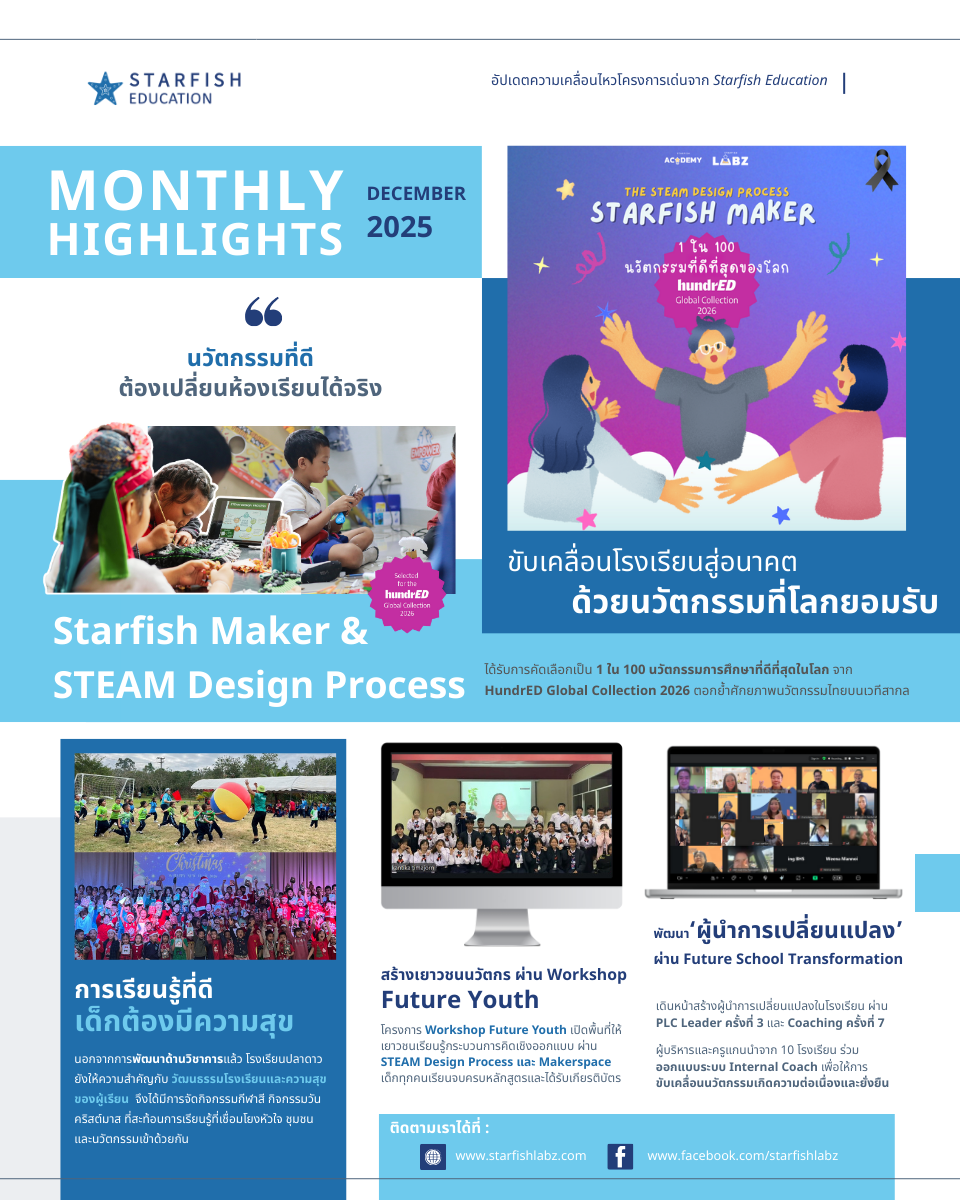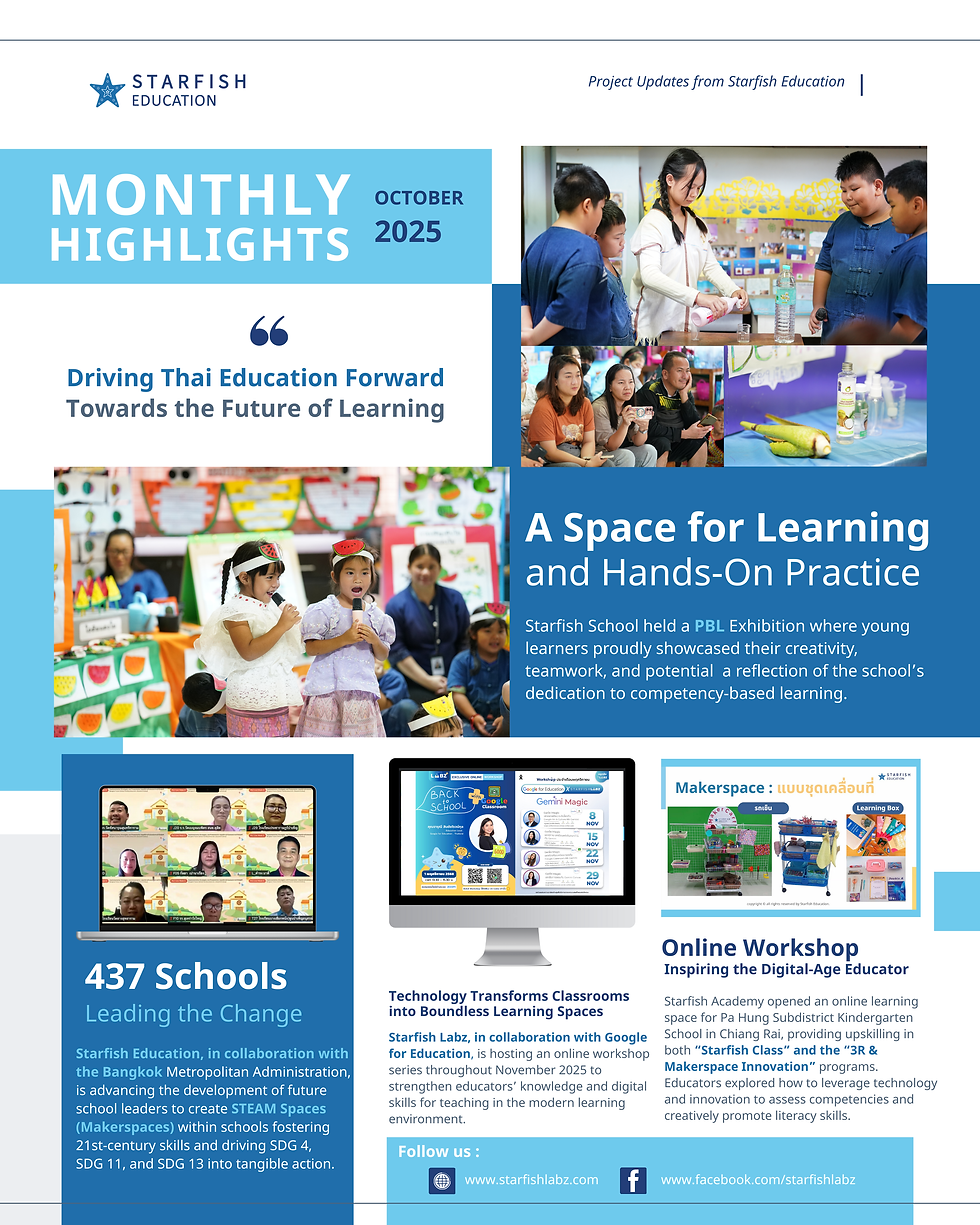Starfish Education Presents Research Results at OTEPC International Forum
- mark87711
- Aug 28, 2024
- 4 min read

The Office of the Teacher Civil Service and Educational Personnel Commission (OTEPC), under the Ministry of Education of Thailand, organized a international forum on teacher professional development with the topic “Collective Leadership: The Key to Success in Future Schooling” on Monday, August 19th at the Asawin Grand Convention Hotel in Bangkok.
This international conference included a variety of activity formats such as special lectures, seminars, and academic presentations by academics from multiple countries such as New Zealand, Taiwan, Canada, Laos and Malaysia.
The Opening Ceremony activity was launched by the Minister of Education, Police General Permpoon Chidchob. He opened the event with the main message by stating: “Joint leadership is extremely important, because we are facing new challenges in organizing education. Therefore, having leadership with a good attitude, flexibility, the ability to adapt and to accept change is very important. Thai education requires cooperation from people with knowledge and experience from many sectors, to drive education towards excellence and stability in life.”
The event emphasized the importance of shared leadership as the key to success and to be an inspiration to administrators and teachers in applying the principles and concepts of shared leadership to the further development of your school.”

Next, Associate Professor Dr. Prawit Erawan, Secretary-General of the OTEPC, added at the opening ceremony: “Joint leadership is about bringing together diverse expertise with diverse ideas to meet the diverse needs of today's learners so that they can live happily in society.”
The atmosphere at the event was filled with the exchange of knowledge from experts in various fields who traveled from many countries. The topic and summary of important points are as follows:
Topic 1: The Powerful of Collective Leadership on Overcoming Educational Challenges and Uncertainties by Prof. Pan Hui Ling Wendy, Tamkang University, Taiwan (R.O.C). In summary, she made the important points that the world is changing rapidly. It has created new challenges for educational leaders, so the power of shared leadership will help us overcome these challenges. Being a co-leader does not mean being the only leader, but it is about using the potential of all of us to help develop Thai education. The principles of joint leadership include: Collective Leadership, Shared Leadership, and Distributed Leadership to create students as learners.

Topic 2: Bridging Student Assessment and Educator Performance: Authentic Tools Developing Future Skills in Teachers and School Leaders by Dr. Nanthaporn Janchalia Seributra, CEO of Starfish Education. In her remarks, Dr. Seributra mentioned that “Starfish Class is a tool for assessing student skills and competencies that helps teachers see the quality of their own teaching and learning. The evaluation is divided into 3 parts: The teacher evaluates students; the teacher evaluates him/herself; and the teacher evaluates results by committee. In addition, administrators must also be able to evaluate themselves. Teachers can use Starfish Class to evaluate along with the academic standing assessment or with WPA. What was found during the research? Teachers saw their own teaching methods and were able to continue to develop themselves. Therefore, what we want to develop further is to enhance Starfish Class to truly meet the needs of PA professional development in order to continue helping teachers who are dedicated to working for children.”
Topic 3: “Collective Leadership: The Key to Success in Future Schooling” by experts from various countries including Professor Darren Bryant, Curtin University, Australia; Associate Professor Qian Haiyan, The Chinese University of Hong Kong; Mr. Scott Haines, Burnside State High School, New Zealand; Mrs. Hajah Ratnawati Binti Haji Mohammad, Model Inclusive School/Keriam Primary School, Brunei Darussalam; and moderation by Associate Professor Dr. Maitri Inprasit, Institute for Research and Development of Teacher Profession for ASEAN, Khon Kaen University.
In summary, everyone sees the importance of joint leadership. It means decentralizing power to all personnel in the school to have decision-making power. There has to be a joint effort. Besides a school being good, what can be done to make every school better and better? A truly strong network (Educational Infrastructure) is needed to provide education that meets the needs of diverse students.
In addition, information from international academics was presented on the topic “The Roles of Collective Leadership in Supporting Education Reform for 21st Century Education” by experts from various countries including Thailand, Canada, Laos and Malaysia. Key points were as follows: Working together as a team joint leadership will result in the ability to lead the school to success. Examples of concrete team building include safety teams, international teams, special education teams, or even doing a professional learning community (PLC) that will help teachers gain ownership. Therefore, the duty of leaders is to share responsibility with those involved in the school, because shared leadership does not depend on a position but rather is a behavior that will help build the power for everyone to be a leader in their own way.
The OTEPC International Forum provided a great deal of knowledge to provide teachers and administrators who can use their learnings to develop their own schools. You can watch recorded sessions from the forum on OTEPC’s official Facebook and YouTube channels, as well as on Starfish Labz (www.starfishlabz.com), ALTV Channel 4, and Fun Learning TV.
.png)



Comments